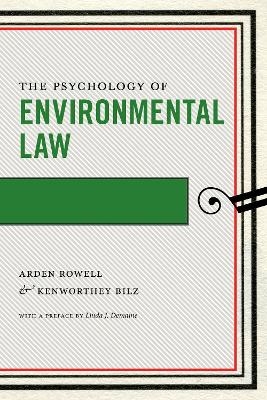
The Psychology of Environmental Law
Seiten
2021
New York University Press (Verlag)
978-1-4798-9186-3 (ISBN)
New York University Press (Verlag)
978-1-4798-9186-3 (ISBN)
Offers psychological insights into how people perceive, respond to, value, and make decisions about the environment
Environmental law may seem a strange space to seek insights from psychology. Psychology, after all, seeks to illuminate the interior of the human mind, while environmental law is fundamentally concerned with the exterior surroundings—the environment—in which people live.
Yet psychology is a crucial, undervalued factor in how laws shape people’s interactions with the environment. Psychology can offer environmental law a rich, empirically informed account of why, when, and how people act in ways that affect the environment—which can then be used to more effectively pursue specific policy goals. When environmental law fails to incorporate insights from psychology, it risks misunderstanding and mispredicting human behaviors that may injure or otherwise affect the environment, and misprescribing legal tools to shape or mitigate those behaviors.
The Psychology of Environmental Law provides key insights regarding how psychology can inform, explain, and improve how environmental law operates. It offers concrete analyses of the theoretical and practical payoffs in pollution control, ecosystem management, and climate change law and policy when psychological insights are taken into account.
Environmental law may seem a strange space to seek insights from psychology. Psychology, after all, seeks to illuminate the interior of the human mind, while environmental law is fundamentally concerned with the exterior surroundings—the environment—in which people live.
Yet psychology is a crucial, undervalued factor in how laws shape people’s interactions with the environment. Psychology can offer environmental law a rich, empirically informed account of why, when, and how people act in ways that affect the environment—which can then be used to more effectively pursue specific policy goals. When environmental law fails to incorporate insights from psychology, it risks misunderstanding and mispredicting human behaviors that may injure or otherwise affect the environment, and misprescribing legal tools to shape or mitigate those behaviors.
The Psychology of Environmental Law provides key insights regarding how psychology can inform, explain, and improve how environmental law operates. It offers concrete analyses of the theoretical and practical payoffs in pollution control, ecosystem management, and climate change law and policy when psychological insights are taken into account.
Arden Rowell (Author) Arden Rowell is Professor at the University of Illinois College of Law, and author of Psychology of Environmental Law, A Guide to U.S. Environmental Law, and A Guide to EU Environmental Law. Kenworthey Bilz (Author) Kenworthey Bilz is Professor of Law in the College of Law at the University of Illinois. She has also taught at Northwestern, Duke, Notre Dame, and KU-Leuven. She teaches courses in criminal law, evidence, negotiations, and psychology. She conducts empirical research in the moral psychology of the law.
| Erscheinungsdatum | 08.02.2021 |
|---|---|
| Reihe/Serie | Psychology and the Law |
| Vorwort | Linda J. Demaine |
| Zusatzinfo | 1 b/w illustration |
| Verlagsort | New York |
| Sprache | englisch |
| Maße | 152 x 229 mm |
| Gewicht | 513 g |
| Themenwelt | Geisteswissenschaften ► Psychologie ► Sozialpsychologie |
| Recht / Steuern ► EU / Internationales Recht | |
| Recht / Steuern ► Öffentliches Recht ► Umweltrecht | |
| ISBN-10 | 1-4798-9186-X / 147989186X |
| ISBN-13 | 978-1-4798-9186-3 / 9781479891863 |
| Zustand | Neuware |
| Haben Sie eine Frage zum Produkt? |
Mehr entdecken
aus dem Bereich
aus dem Bereich
Buch | Softcover (2024)
Heyne (Verlag)
12,00 €


